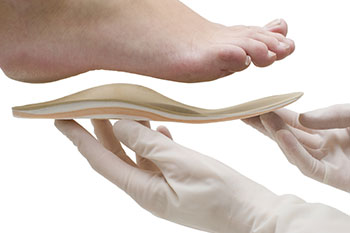
Custom orthotics are prescription, custom-made devices that are worn inside your shoes. Unlike non-prescription, over-the-counter (OTC) inserts, prescription orthotics are custom fit to your individual foot structure, designed for the way you move, and made to address your specific condition.
Custom orthotics can provide superior support and cushioning, as well as treat a variety of painful foot and ankle issues including plantar fasciitis and other heel pain, flat feet or high arches, bunions, hammertoes, arthritis, tendinitis, bursitis, diabetic foot ulcers and more. Custom orthotics can help improve functionality and alignment in the feet and ankles, and encourage normal biomechanical motion.
There are two types of custom orthotics: functional and accommodative. Functional orthotics are corrective. They are designed to help position feet and ankles properly to correct and control their movement. They are often used to correct gait anomalies such as overpronation or underpronation.
Accommodative orthotics’ primary function is to provide comfort. They are designed to support and cushion, while redistributing weight evenly across the foot and away from trouble areas. They can be used to treat things like diabetic foot ulcers, arthritis, and heel pain.
Custom orthotics are prescribed by a podiatrist who is highly skilled in biomechanics of the lower extremities. They will ask you questions about your issue, examine you, consider your overall health and assess how you walk with a gait analysis. They will prescribe a custom orthotic device to help your specific condition.
To ensure a perfect custom fit, they will create an accurate 3D model of your feet either using a 3D computer scan or plaster casting. On the other hand, purchasing OTC insoles in a store requires you to self-diagnose your condition and choose insoles that are mass produced and pre-fabricated for different shoe sizes-not your individual foot structure. Improperly fitted OTC insoles may make your shoes feel uncomfortable and, in some cases, may cause new conditions and discomfort.
The materials used in prescription custom orthotics are superior to that of OTC insoles as well. Functional custom orthotics are typically manufactured with semi-rigid or rigid materials, such as graphite or plastic, and accommodative orthotics are usually made with EVA foam or cork. OTC insoles are made of inexpensive materials such as rubber, flexible plastic or gel. These materials do not offer the same quality or effectiveness. They lose integrity faster and do not last as long as custom orthotics.
Ask your podiatrist for more information about custom orthotics, and whether they may help your foot or ankle condition.
